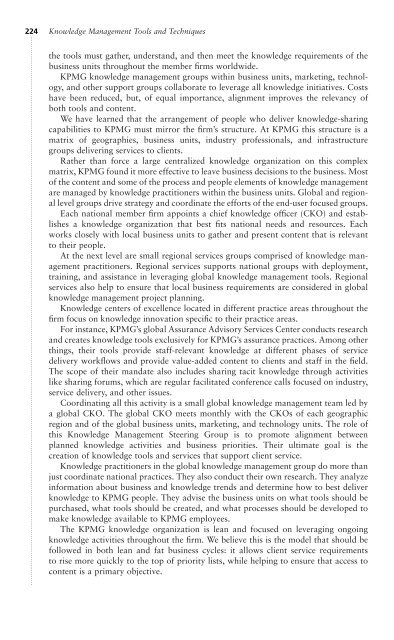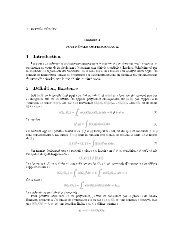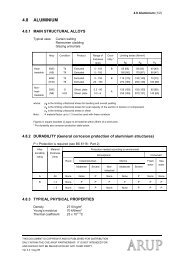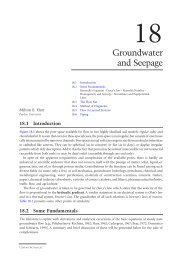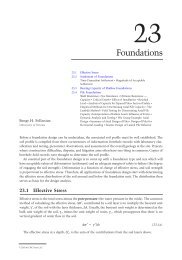- Page 2 and 3:
Knowledge Management Tools and Tech
- Page 4 and 5:
Knowledge Management Tools and Tech
- Page 6 and 7:
Contents Preface ..................
- Page 8 and 9:
Contents vii 13 Hewlett-Packard: Ma
- Page 10 and 11:
Contents ix Part III 29 Tools for T
- Page 12 and 13:
Preface xi The first book in this s
- Page 14 and 15:
To the struggle for knowledge, peac
- Page 16 and 17:
Overview: The Social Life of KM Too
- Page 18 and 19:
This book is not intended to provid
- Page 20 and 21:
Overview: The Social Life of KM Too
- Page 22 and 23:
Overview: The Social Life of KM Too
- Page 24 and 25:
“Knowledge sharing can be hampere
- Page 26 and 27:
Overview: The Social Life of KM Too
- Page 28 and 29:
Overview: The Social Life of KM Too
- Page 30 and 31:
Figure 1.1 Interface for rating kno
- Page 32 and 33:
Actually, the concept of KM can be
- Page 34 and 35:
Senior VP for communications and In
- Page 36 and 37:
Literature Review The rapid adoptio
- Page 38 and 39:
Overview: The Social Life of KM Too
- Page 40 and 41:
“Just as no company will probably
- Page 42 and 43:
Allee uses a “holo-mapping” tec
- Page 44 and 45:
A true EKP would record the history
- Page 46 and 47:
A pilot deployment is highly recomm
- Page 48 and 49:
Though IT-based tools for KM can de
- Page 50 and 51:
Table 1.2 Properties of Knowledge A
- Page 52 and 53:
Table 1.4 continued Overview: The S
- Page 54 and 55:
Table 1.7 Overview: The Social Life
- Page 56 and 57:
Table 1.8 continued Knowledge Porta
- Page 58 and 59:
Table 1.11 Roles and Tools for Onli
- Page 60 and 61:
have also been delivered to the bot
- Page 62 and 63:
Fuji-Xerox The growth of IT-based t
- Page 64 and 65:
funnel, and creativity sessions are
- Page 66 and 67:
Part III: Vendor Reports Expertise
- Page 68 and 69:
Online CoPs have been deployed at D
- Page 70 and 71:
Overview: The Social Life of KM Too
- Page 72 and 73:
Capacity Create and circulate adequ
- Page 74 and 75:
secure company secrets or confident
- Page 76 and 77:
Overview: The Social Life of KM Too
- Page 78 and 79:
KM Metrics Overview: The Social Lif
- Page 80 and 81:
Table 1.14 KM Metrics (1) Scope of
- Page 82 and 83:
Overview: The Social Life of KM Too
- Page 84 and 85:
Figure 1.4 Knowledge Management for
- Page 86 and 87:
Overview: The Social Life of KM Too
- Page 88 and 89:
Interview: Knowledge Management at
- Page 90 and 91:
Part I
- Page 92 and 93:
Knowledge Management at Accenture*
- Page 94 and 95:
Figure 2.1 The evolution of Accentu
- Page 96 and 97:
subject matter experts. “Communit
- Page 98 and 99:
• Discovering, researching, and u
- Page 100 and 101:
Figure 3.1 May-Sept 2001 Oct-Dec 20
- Page 102 and 103:
edesigning, retesting, and then dep
- Page 104 and 105:
Figure 3.2 Pro-forma social & intel
- Page 106 and 107:
Plan, Design, Execute . . . Reap? 9
- Page 108 and 109:
Lessons Learned Plan, Design, Execu
- Page 110 and 111:
4 Power to the People: Supporting C
- Page 112 and 113:
was established, leading to a full-
- Page 114 and 115:
Supporting Collaborative Behaviors
- Page 116 and 117:
Figure 4.1 Actual meetings by month
- Page 118 and 119:
ABB’s tool of choice to fulfill t
- Page 120 and 121:
Figure 4.4 Features of the e-Meetin
- Page 122 and 123:
exist. Only by creating an adequate
- Page 124 and 125:
A Work in Progress: The Phoenix K-e
- Page 126 and 127:
Figure 5.1 The Phoenix K-ecosystem
- Page 128 and 129:
Figure 5.3 CMDB The Phoenix K-ecosy
- Page 130 and 131:
Figure 5.4 The Phoenix K-ecosystem
- Page 132 and 133:
Figure 5.6 The Phoenix K-ecosystem
- Page 134 and 135:
a single page, enables the global t
- Page 136 and 137:
ERP Path Traditional ERP software p
- Page 138 and 139:
Schemes and Tools for Social Capita
- Page 140 and 141:
Table 6.1 Schemes and Tools for Soc
- Page 142 and 143:
Table 6.2 CoP participation Company
- Page 144 and 145:
Figure 6.2 Figure 6.3 Inferred rela
- Page 146 and 147:
Figure 6.4 NetMap Solutions FM Coal
- Page 148 and 149:
Schemes and Tools for Social Capita
- Page 150 and 151:
eporting through the use of tools f
- Page 152 and 153:
Knowledge Management in Practice: M
- Page 154 and 155:
Making Technology Work at DaimlerCh
- Page 156 and 157:
Figure 7.2 CoPs/Tech Clubs Challeng
- Page 158 and 159:
combined with NDT (Non-Destructive
- Page 160 and 161:
except in cases where the nature of
- Page 162 and 163:
Ready for Take-off: Knowledge Manag
- Page 164 and 165:
Knowledge Management Infrastructure
- Page 166 and 167:
We started with daily news content,
- Page 168 and 169:
that a KM system would bring (for e
- Page 170 and 171:
Building and Sustaining Communities
- Page 172 and 173:
assessment or preselect one vendor
- Page 174 and 175:
Figure 9.1 Guest/ User Expert User
- Page 176 and 177:
161 Table 9.1 KM Program 2002-2005
- Page 178 and 179:
Experiences with Knowledge Communit
- Page 180 and 181:
how people share knowledge seems to
- Page 182 and 183:
While John Peetz, Ralph Poole, and
- Page 184 and 185:
unique to Quickplace, but whatever
- Page 186 and 187:
• Staff can log in to demonstrati
- Page 188 and 189: technology. A key step in the chang
- Page 190 and 191: Knowledge Management Processes and
- Page 192 and 193: Knowledge Management Processes and
- Page 194 and 195: Figure 11.1 Typical structure of a
- Page 196 and 197: Phase 3 By 1999, the number of CoPs
- Page 198 and 199: segments of the U.S. Navy. Although
- Page 200 and 201: The Knowledge Assessment Program fo
- Page 202 and 203: a for each department in a company
- Page 204 and 205: The Knowledge Assessment Program 18
- Page 206 and 207: The Knowledge Assessment Program 19
- Page 208 and 209: Figure 12.5 Examples: Two Typical C
- Page 210 and 211: From the KM Architecture Model surv
- Page 212 and 213: Hewlett-Packard: Making Sense of Kn
- Page 214 and 215: Hewlett-Packard: Making Sense of Kn
- Page 216 and 217: Figure 13.4 outcome Technology enab
- Page 218 and 219: Figure 13.5 Hewlett-Packard: Making
- Page 220 and 221: • Engage business leaders—Your
- Page 222 and 223: Most of New Zealand’s small techn
- Page 224 and 225: Figure 14.1 Electronic forums at th
- Page 226 and 227: material that they would normally b
- Page 228 and 229: The Way Forward A New Zealand Case
- Page 230 and 231: The Nursing Leadership Academy on P
- Page 232 and 233: The Nursing Leadership Academy on P
- Page 234 and 235: Figure 15.1 The Nursing Leadership
- Page 236 and 237: 3. Design your user interface for t
- Page 240 and 241: Knowledge Toolkit This knowledge or
- Page 242 and 243: 17 Interorganizational KM: The Expe
- Page 244 and 245: The Experience of Australia’s NOI
- Page 246 and 247: Two knowledge management tools are
- Page 248 and 249: The Experience of Australia’s NOI
- Page 250 and 251: Knowledge Strategy in Small Organiz
- Page 252 and 253: While the development of the strate
- Page 254 and 255: The Office of Small Business, Austr
- Page 256 and 257: of Small Business is represented by
- Page 258 and 259: ather than culture based, in retros
- Page 260 and 261: not solely the domain of large busi
- Page 262 and 263: Rolls-Royce plc Rolls-Royce plc is
- Page 264 and 265: A Day in the Life of a Rolls-Royce
- Page 266 and 267: Several expert “people pages” h
- Page 268 and 269: depending on the type of knowledge
- Page 270 and 271: Creativity, the Knowledge Connector
- Page 272 and 273: Figure 20.1 Contract gate The innov
- Page 274 and 275: The Creativity Awareness Model The
- Page 276 and 277: Creativity, the Knowledge Connector
- Page 278 and 279: Figure 20.3 A snapshot from TechOpt
- Page 280 and 281: ativity sessions is best reflected
- Page 282 and 283: Structures Creativity, the Knowledg
- Page 284 and 285: URDV Team Award Creativity, the Kno
- Page 286 and 287: our greatest assets.” The fact is
- Page 288 and 289:
Figure 21.1 HR’s intranet: YourNe
- Page 290 and 291:
Promoting Empowerment and Knowledge
- Page 292 and 293:
manager to control the hiring proce
- Page 294 and 295:
Thus, this proxy of a directory of
- Page 296 and 297:
Part II
- Page 298 and 299:
“A Fool with a Tool Is Still a Fo
- Page 300 and 301:
Tools for Knowledge Codification Th
- Page 302 and 303:
certain configuration with other to
- Page 304 and 305:
Table 22.2 Multidimensional Matrix
- Page 306 and 307:
Techbuck Score Card Noted underworl
- Page 308 and 309:
Collaboration Software: Evolution a
- Page 310 and 311:
ensuring the right level of manager
- Page 312 and 313:
Figure 23.3 Synchronous/ real-time
- Page 314 and 315:
Figure 23.5 Instant messaging and c
- Page 316 and 317:
Over the next two years, we will co
- Page 318 and 319:
Complementary Partners, Reinforcing
- Page 320 and 321:
the mission of remaining aware and
- Page 322 and 323:
9. Counterintelligence and informat
- Page 324 and 325:
important if the scope will cover j
- Page 326 and 327:
Evolution of Knowledge Portals* Hei
- Page 328 and 329:
pleted to finish the task. You can
- Page 330 and 331:
sales force automation (SFA), or su
- Page 332 and 333:
Figure 25.1 General Portals Excite.
- Page 334 and 335:
tional efficiency. The goal was to
- Page 336 and 337:
Introduction Stories that describe
- Page 338 and 339:
From e-Learning to e-Knowledge 323
- Page 340 and 341:
• Next generation Internet techno
- Page 342 and 343:
core to the way we learn and develo
- Page 344 and 345:
Social Network Analysis in the KM T
- Page 346 and 347:
goals and uses of analyzing the con
- Page 348 and 349:
Using a Network Map for Diagnosis a
- Page 350 and 351:
7. Target areas where insufficient
- Page 352 and 353:
Figure 27.4 The resulting survey ne
- Page 354 and 355:
Figure 27.5 Network analysis showin
- Page 356 and 357:
Figure 27.7 A focused view into gro
- Page 358 and 359:
“outlier” from the team in the
- Page 360 and 361:
Trends in Social Software Social Ne
- Page 362 and 363:
28 Approach to KM* Selforganization
- Page 364 and 365:
Table 28.1 Self-organization: Takin
- Page 366 and 367:
At the University of California, Lo
- Page 368 and 369:
Emotional Intelligence in the Workp
- Page 370 and 371:
Table 28.3 continued Analyzing info
- Page 372 and 373:
Self-organization: Taking a Persona
- Page 374 and 375:
Self-organization: Taking a Persona
- Page 376 and 377:
ing, collaborate with colleagues, a
- Page 378 and 379:
Part III
- Page 380 and 381:
Tools for Tapping Expertise in Larg
- Page 382 and 383:
experiences and learning), and the
- Page 384 and 385:
well an instrument works is typical
- Page 386 and 387:
Figure 29.2 Tools for Tapping Exper
- Page 388 and 389:
Tools for Tapping Expertise in Larg
- Page 390 and 391:
Integration not only renders the EK
- Page 392 and 393:
Mapping the EKN to relevant existin
- Page 394 and 395:
Figure 30.1 Entopia Knowledge Locat
- Page 396 and 397:
Space and Naval Warfare Systems Cen
- Page 398 and 399:
Integrated KM Solutions: The Experi
- Page 400 and 401:
Effective Knowledge Management for
- Page 402 and 403:
Relationship knowledge also comes i
- Page 404 and 405:
There are two technologies in commo
- Page 406 and 407:
Effective Knowledge Management for
- Page 408 and 409:
Leveraging Content in Enterprise Kn
- Page 410 and 411:
From Transactional to Knowledge Wor
- Page 412 and 413:
Leveraging Content in Enterprise Kn
- Page 414 and 415:
Figure 32.1 A visualization can pro
- Page 416 and 417:
Figure 32.3 The document level view
- Page 418 and 419:
customers, or to retain or destroy
- Page 420 and 421:
Structured Knowledge: The Key to Op
- Page 422 and 423:
The Key to Optimal Contact Center E
- Page 424 and 425:
The Key to Optimal Contact Center E
- Page 426 and 427:
About the Contributors Patti Anklam
- Page 428 and 429:
About the Contributors 413 has co-a
- Page 430 and 431:
About the Contributors 415 Stephen
- Page 432 and 433:
About the Editor Madanmohan Rao, a
- Page 434 and 435:
Index A ABB. See Asea Brown Boveri
- Page 436 and 437:
CNA insurance, 365, 369 Cohesion, d
- Page 438 and 439:
personnel rotation around strategic
- Page 440 and 441:
Finding versus using, leveraging co
- Page 442 and 443:
Intraspect, 351 Investment, return
- Page 444 and 445:
frameworks of, 33-44 at Fuji-Xerox,
- Page 446 and 447:
Legal discovery, leveraging content
- Page 448 and 449:
Online communities, 132 of practice
- Page 450 and 451:
Rolls-Royce plc, 246-254 benchmarki
- Page 452 and 453:
Time changes in social network evol


